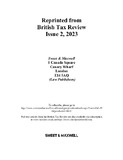| dc.contributor.author | Tilahun, Nathanael | |
| dc.contributor.author | Yihdego, Abebe G. | |
| dc.coverage.spatial | Britain | en |
| dc.date.accessioned | 2023-08-16T10:18:32Z | |
| dc.date.available | 2023-08-16T10:18:32Z | |
| dc.date.issued | 2023-07 | |
| dc.identifier.citation | Tilahun, N. and G. Yihdego, A. (2023) 'Unsuccessful Implementation of the OECD Transfer Pricing Guidelines in Low Income Countries: The Case of Ethiopia', British Tax Review Issue, Issue 2 2023 | en |
| dc.identifier.uri | https://opendocs.ids.ac.uk/opendocs/handle/20.500.12413/18082 | |
| dc.description.abstract | Much international technical assistance is directed towards increasing the capacity of tax authorities in
low-income countries to understand and effectively implement the OECD Transfer Pricing Guidelines,
and thus retain their fair share of revenue from the transnational economic transactions of multinational
enterprises. The outcome of such assistance, although varied, has been generally disappointing. Constraints
on material capability are considered the main explanations for the failure of low-income countries to
implement transfer pricing rules in practice. By taking Ethiopia as a case study, this article builds on the
capacity explanation and shows that capacity is only a generic explanation that needs to be accompanied
by context-specific explanations that are not bound to material capability. Despite more than a decade
of effort, and nearly two decades since the initial introduction of transfer pricing rules in the tax system,
the Ethiopian tax administration has not successfully completed a single transfer pricing audit. This article
identifies three country-specific factors that explain the abysmal record of implementation of transfer
pricing rules in Ethiopia: the inability of tax officers to depart from long-standing practices that run
counter to OECD Guidelines; institutional ambiguity and rivalry among tax policy and enforcement
organs; and the possibility of mock compliance with international standards without in practice there
being any such compliance. In combination, these factors show that procedures recommended by the
OECD for dealing with transfer pricing issues are so far removed from what are in fact the existing
practices of the Ethiopian national tax administration that the formal adoption of OECD Guidelines has
resulted in little more than organisational re-labelling. | en |
| dc.language.iso | en | en |
| dc.publisher | Sweet and Maxwell | en |
| dc.rights.uri | https://www.sweetandmaxwell.co.uk/british-tax-review/index.aspx | |
| dc.subject | Finance | en |
| dc.title | Unsuccessful Implementation of the OECD Transfer Pricing Guidelines in Low Income Countries: The Case of Ethiopia | en |
| dc.type | Article | en |
| dc.rights.holder | Sweet and Maxwell. Permission has been recieved to host a PDF version of this article. Please contact the rights holder directly for reuse permissions. | en |
| dc.identifier.externaluri | https://www.sweetandmaxwell.co.uk/british-tax-review/index.aspx | en |
| rioxxterms.funder | Default funder | en |
| rioxxterms.identifier.project | Default project | en |
| rioxxterms.version | VoR | en |
| rioxxterms.funder.project | 43db2a26-ab53-4dd1-873f-cff26a51d1e0 | en |

